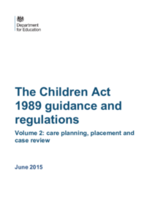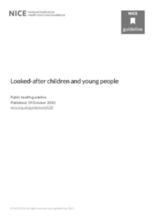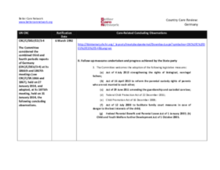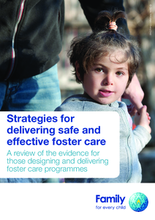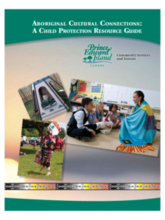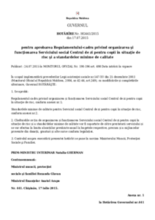Displaying 101 - 110 of 365
This article describes the current strategies of the “Building a Europe for and with Children” programme, a programme of the Council of Europe. The strategy focuses on four areas of action: promoting child-friendly services and systems; eliminating all forms of violence against children; guaranteeing the rights of children in vulnerable situations, and promoting child participation. A further standard is available on children’s rights and social services friendly to children and families for ensuring that children lacking or placed outside parental care are given adequate treatment.
Volume 2 of the Children Act 1989 Guidance and Regulations provides guidance, primarily addressed to local authorities and their staff in England, about their functions under Part 3 of the Children Act 1989 which concerns the provision of local authority support for children and families. In particular it describes how local authorities should carry out their responsibilities in relation to care planning, placement and case review for looked after children.
This guideline covers how organisations, professionals and carers can work together to deliver high quality care, stable placements and nurturing relationships for looked-after children and young people in England.
This video provides instruction on the code of ethics and other standards of care for those who work in the field of Child and Youth Care.
This country care review includes the care related Concluding Observations adopted by the Committee on the Rights of the Child and the Committee on the Rights of Persons with Disabilities.
This easy to use resource from the Ministry of Gender Labour and Social Development in Uganda, in consultation with civil society, outlines a continuum of care framework for responding to vulnerable children.
Este taller está diseñado para entrenar los expertos técnicos en los valores y principios básicos involucrados en la labor del trabajo de Protección de Niñez y Adolescencia.
This report from Family for Every Child begins to fill the gap in understanding on how to deliver effective, safe foster care programmes through an exploration of the literature and interviews with experts.
This resource guide offers a fairly comprehensive guide to engaging with the Aboriginal community on Prince Edward Island, Canada. It includes a history of the use of residential schools for Aboriginal children, as well as a description of the widespread removal of Aboriginal children from their families and communities for adoption placement in the 1960s through the 1980s.
În scopul implementării prevederilor Legii asistenţei sociale nr.547-XV din 25 decembrie 2003 (Monitorul Oficial al Republicii Moldova, 2004, nr.42-44, art.249), cu modificările și completările ulterioare, Guvernul HOTĂRĂŞTE:


